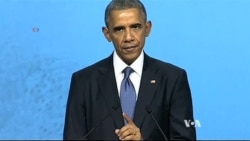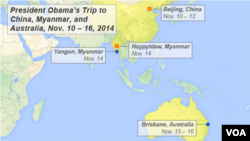President Barack Obama has a received a warm welcome in China, despite tensions on issues like trade, human rights, and China’s territorial claims in the East and South China Seas.
Relations between the two countries have been strained, in large part, because of Chinese suspicions that the United States wants to contain China’s growth.
But both sides appeared wanting to accentuate the positive aspects of their relationship.
Chinese leaders welcomed Obama at Beijing airport Monday with an honor guard and red carpet.
Addressed APEC summit
Later, Obama addressed business leaders at the Asia-Pacific Economic Cooperation summit. Dispelling Chinese suspicions topped his agenda.
“The United States welcomes the rise of a prosperous, peaceful, and stable China. I want to repeat that," the president said.
"We welcome the rise of a prosperous, peaceful and stable China. In fact, over recent decades, the United States has worked to help integrate China into the global economy. Not only because it’s in China’s best interests, but because it’s in America’s best interests and the world’s best interests. We want China to do well," Obama said.
Deepening relations with China, Obama said, will mean more jobs and opportunity for the American and Chinese people.
Obama also announced Monday a new visa policy with China, one that will increase the validity of short-term tourist and business visas issued to one another's citizens from one to 10 years - the longest validity allowed under U.S. law - and extend the validity of student and exchange visas from one to five years.
The new agreement will go into effect November 12.
Strained relations
But Obama arrived in Beijing Monday for a visit that comes during a time of strained U.S.-Sino relations on issues ranging from cyber espionage to human rights as well as an impression among Chinese leaders that the U.S., through the rebalance of its forces to the Pacific, is trying to contain China.
Washington and Beijing are pursuing rival trade deals.
Obama is scheduled to hold talks with his Chinese counterpart, Xi Jinping, late Tuesday.
The APEC summit is a chance for Obama to rally Asia-Pacific nations to overcome obstacles to approve the long-delayed TransPacific Partnership trade agreement.
The U.S. leader gathered heads of state of 11 countries at the American embassy in Beijing and urged them to get past what he said are remaining “logjams.”
On human rights, Obama refrained from condemning China for its behavior in Hong Kong, where demonstrators for months have accused Beijing of violating its commitment to not interfere in the autonomous region’s democratic process.
The U.S. leader, however, said he remains concerned about what he described as a situation that is historically complicated.
Agenda
Monday was the start of Obama’s three-day visit to Beijing for the APEC summit and meetings with Xi.
He also held bilateral talks Monday with Indonesian President Joko Widodo and Australian Prime Minister Tony Abbott. Obama had a brief encounter with Russian President Vladimir Putin, but U.S. officials say the two leaders did not have time to discuss any issues.
On Wednesday, he will travel to Myanmar, also known as Burma, before going to the G-20 summit in Australia.
Pushing an agenda of greater cooperation will not be easy for Obama, who comes to Beijing politically weakened by mid-term elections at home.






